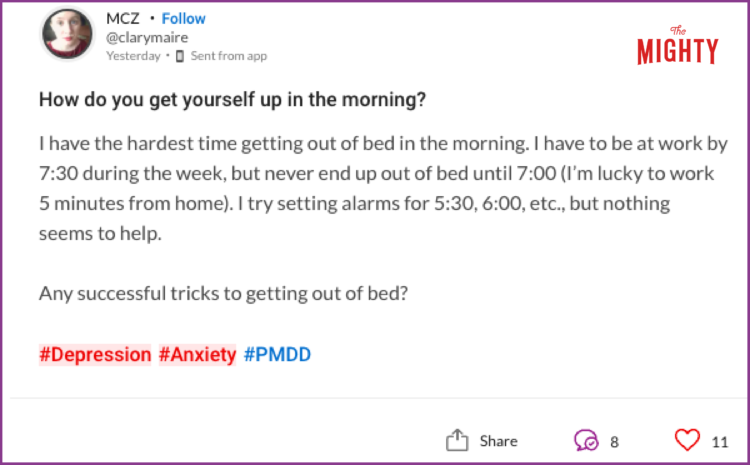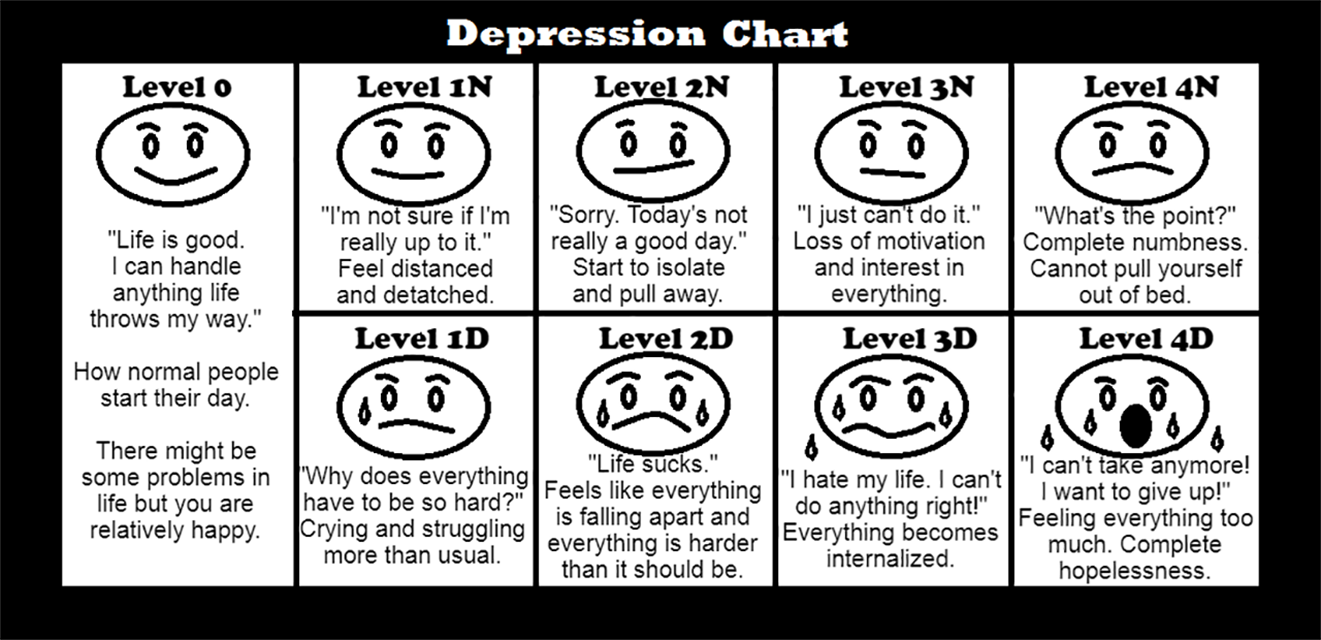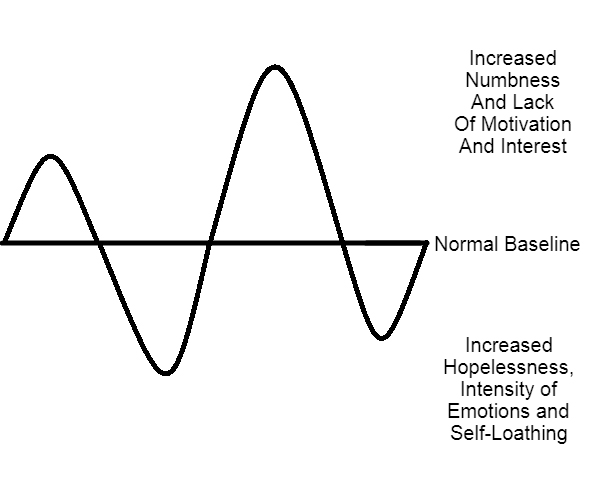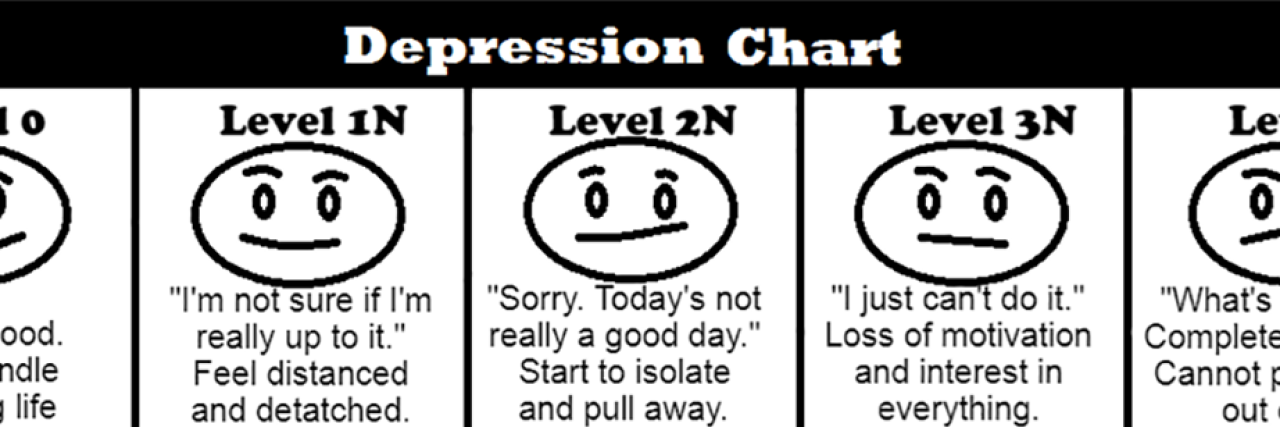The 'Depression Chart' I Made to Help Others Understand My Depression
Editor's Note
If you experience suicidal thoughts, the following post could be potentially triggering. You can contact the Crisis Text Line by texting “START” to 741741.
Ever since I created my anxiety chart, I have been asked by readers to create a similar chart for depression. After much thought and consideration, this is the chart and accompanying graph I designed.
Many people do not understand depression, assuming it is just random bouts of sadness and crying. Unless someone has lived through their own struggle with depression, it is near impossible for them to truly understand how debilitating it can be to live with that diagnosis.
One of the hardest parts of explaining depression is that it is neither rational nor predictable. It is hard to provide relatable examples because the feelings connected with depression would feel wildly irrational to anyone not experiencing them at that moment. It is also impossible to predict or predetermine depression because it often comes unexpectedly in waves.
Help MCZ out by answering the question below: 
Therefore, instead of providing a chart with relatable examples, the chart I devised shows the increasing intensity of this mental illness. My hope is that the statements provided at each level, combined with the descriptions included, will help those who have never struggled with depression understand how our frame of mind is magnified as our condition worsens.
It is also important to note that depression is not all sadness and hopelessness. Instead of providing a chart listing levels 1-9, I have split this chart in half. There is a 1-4N chart to designate worsening stages of numbness and a 1-4D chart to describe stages of downward spiral. This chart is extremely simplified yet illustrates how, as depression worsens, the intensity of the condition increases. However, unlike conditions like anxiety which worsen in one direction, depression can and does frequently occur in both the realms of numbness and hopelessness to varying extents.

It is also important to note that depression is not linear. It comes in waves and spikes. It is not uncommon to struggle with days of increasing numbness, only to wake up the following day in the midst of a downward spiral. Depression randomly alternates between the two, with no rhyme or reason to the length or intensity on any given day. Some days, you feel nothing at all; other days, you feel everything too strongly. There’s no way to predict when you will be pulled in either direction or how long either will last.
There will be days when someone might even feel fine, or even just more functional. On other days, you might be unable to pull yourself out of bed or might seem to cry over everything. There are days that feel like a struggle and others that feel completely impossible — days where you find yourself crying a little bit more and days you just want to give up.
When describing increased emotional pain, the best example I can think of is to compare it to the pain of loss. Milder stages of depression might be akin to losing something that matters to you, perhaps something of sentimental value. As depression increases, imagine the pain of losing a beloved pet, your parents, your spouse or your child. Imagine the ache and the pain, the feeling in that moment of things never being OK again, of wanting to give up, to crumble under the weight of that pain.
Except that the person you are mourning is yourself — your happiness and who you used to be. And the loss comes again and again in waves, sometimes mild, other times so severe that the tears and the pain feel like they will never stop.

At the same time, you loathe and disgust yourself. You feel worthless — a waste of space. Your own mind lies to you, convincing you the world would be better off without you in it. That is where rationality parts ways. Everyone can understand loss, pain and grieving, but it is hard to wrap your head around losing yourself, let alone hating yourself, unless you have spiraled down to those depths yourself.
Yet those feelings are there, along with a tremendous amount of guilt. You feel guilty that you are such a mess. You feel guilty for subjecting everyone else to your mess, as well. Often, you are also ashamed of your illness because you feel you should be stronger, more capable, better than you are. That shame often leads you to lie or minimize the intensity of your suffering for fear of being judged. Depression makes you feel like a failure just for being sick.
When someone is struggling with depression, their very perceptions become distorted. It is common for everything to feel much worse than it actually is. Think back to when you were a little child. Things on the counter felt up way too high, the doorknob out of reach. Even simple things like tying your shoes were a struggle and felt like a monumental task that took maximum effort and concentration. That is how everyday tasks feel when you have depression. Everything feels harder. Every problem feels bigger. You feel small and helpless.
Think back, too, to when you were a young child and were upset with your parents, when you felt completely misunderstood and all alone in the world. Think back on the time when your 4 or 5-year-old self was convinced you should run away, that nobody would care if you were gone. Think back to any other point in your life, as well, when you felt completely alone, when you had no help, nobody there. With depression, those feelings are ever-present. Your mind tells you that nobody understands, that you are alone in the world. Depression isolates you by telling lies that you do not matter.
Think back to the last time you were sick, laid up in bed with a bad flu or stomach bug. Remember how physically and mentally exhausting it felt to even move or pull yourself out of bed? How easily you found yourself worn out, just wanting to lie back down and sleep? How you put off going to the bathroom for hours because you didn’t even want to move? How you ate frozen waffles or canned soup for three days because you just did not have the energy or the desire to cook a real meal? That is what depression is like, too.
The numbness, however, is hard to explain to anyone who has not experienced it firsthand. If you’ve ever had someone or something upset you so much that you no longer cared, magnify that lack of concern tenfold. It is similar to that catatonic shock following an accident or trauma. You feel nothing, lost, blank, numb. Eventually, you mentally shut down. You are immobile, held hostage, trapped in your own mind. You have no interest or motivation to do anything. You see no point in even trying.
I wish there were more relatable examples I could give but it is impossible to rationalize the irrational. There are some examples that are somewhat similar in one way or another, but even those don’t quite equate. The best I can do is to illustrate the directions depression can go and to quantify how bad it can get.
When trying to explain depression, the best someone who is struggling can do is to explain how close we are at the given moment to either shutting down or wanting to give up. The worst part is that the status can change in a moment’s notice on any given day. There is no way to predict when it will veer off in either direction, let alone the severity of the bout. You cannot even predict what will cause your condition to worsen, or whether it will even be something large or small. Something as tragic as a great loss is just as likely to cause a period of numbness as a simple broken plate is to cause a severe downward spiral. There are times we are honestly not even sure why we are feeling the way we do, only that the depression is there. There is no rhyme, reason or rationality to any of it.
It is not something a person can control in any way, either, let alone simply snap out of on their own accord. Depression is a mental illness. It is a medically diagnosed condition that severely affects the ability to cope with life, negatively impacting and impairing both thoughts and behaviors. Having a mental illness is no different than having any other type of illness. Much like a diabetic has a pancreas that is malfunctioning, when a person has a mental illness, their brain is not working correctly. The only difference is the organ affected. Both conditions need medical treatment.
I understand how difficult it must be for someone who has never experienced depression themselves to understand. Depression seems irrational because it is. It doesn’t make sense, even to those of us struggling with it every day. We find ourselves on a roller coaster ride that is speeding out of control, flying up and down every which way, with no way to stop or slow down. Nobody asks for a mental illness. Depression is not something anyone has done to themselves or is causing because they are not trying hard enough. We don’t understand how we even ended up on this ride, let alone how to get off. How can we adequately explain something we don’t even understand ourselves?
The confusion surrounding depression is also in part due to the stigma attached to mental illness in general. For years, anyone with a mental illness was labeled as lazy, “crazy,” dangerous or a joke. Either way, they were not taken seriously. Mental illness was a dirty word that wasn’t discussed openly. People fear or mock what they don’t understand. The lack of education about medical conditions like depression led to widespread ignorance and misinformation. Unfortunately, once that cat is out of the bag, the damage is done and it will take much longer to properly educate people about mental illness than it took to originally spread the falsehoods and misconceptions.
I fully understand depression makes no sense to someone who has never experienced it themselves. It honestly makes no sense to us, either. But please know that depression is much more than just merely feeling sad from time to time. With depression, you sometimes feel everything so strongly that it is completely overwhelming, the emotions feel agonizingly painful and never-ending, and the world feels utterly hopeless. Other times, someone with depression is completely numb, feeling absolutely nothing at all. Either way, everything feels much harder, more intense. Depression is exhausting, both physically and mentally. Perhaps worst of all, you feel helpless to do anything, like you have no control over your own mind. And depression is not linear. It goes up and down, every which way, changing direction and intensity on the drop of a dime.
I wish I could provide a chart that was more relatable for those who have never experienced depression, but, as I have stated before, there really is no way to rationalize the irrational. The best I can do is to lay out what depression is like in a very simplified form and hope for your empathy, compassion, understanding and patience.
A version of this article originally appeared on Unlovable.
Images via contributor.

